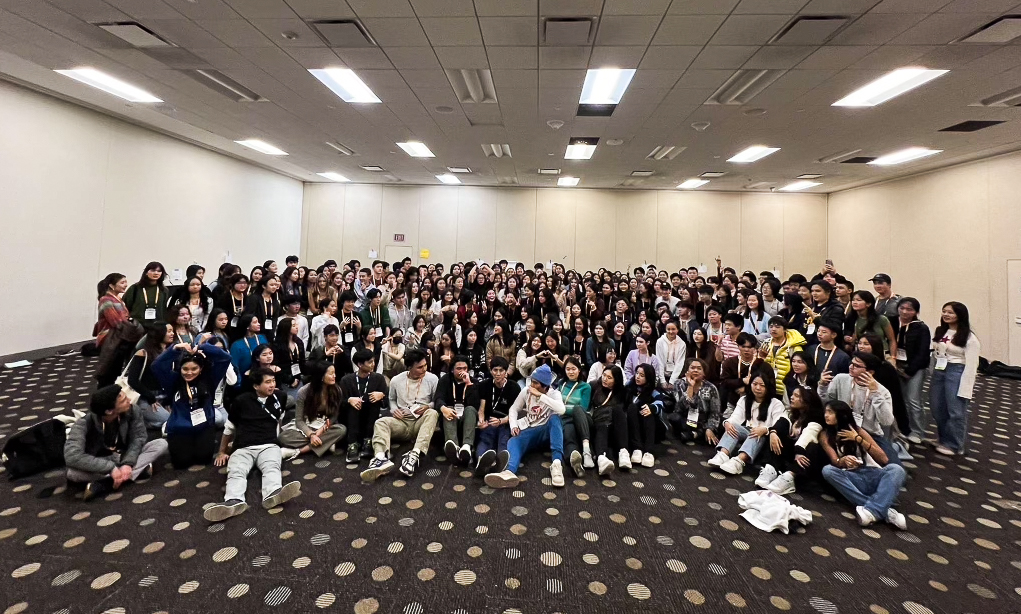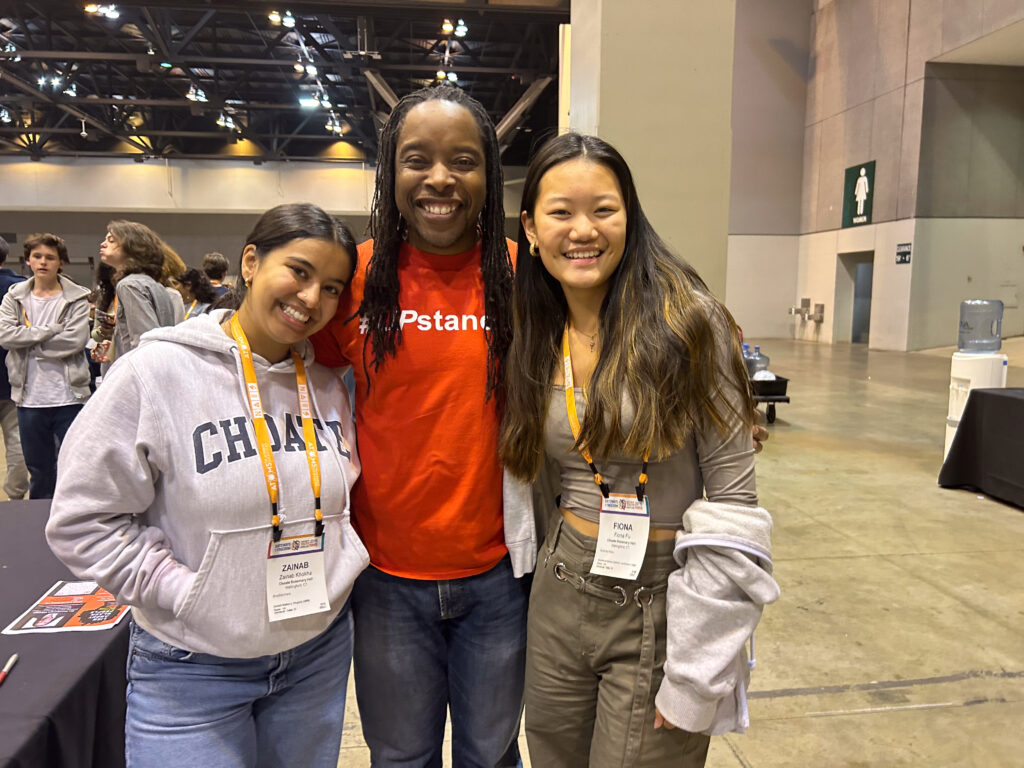
SDLC participants attend in affinity groups to discuss diversity.

Choate students connect with SDLC Keynote Speaker, Dr. Omèkongo Dibinga.
By Fiona Fu ’25
After two flights and a long day of bonding by proximity, 13 faculty and six students traveled from Wallingford to St. Louis, Missouri, to attend the annual three-day National Association of Independent Schools (NAIS) People of Color Conference (PoCC) and Student Diversity Leadership Conference (SDLC), respectively.
The events were an opportunity for students and teachers from all over the country to meet and engage in dialogue on how to be more inclusive in school spaces.
Over a total of 8,100 people attended the two conferences, with about 6,000 educators at PoCC and 2,000 students at SDLC. As the school participants of PoCC and SDLC are chosen by lottery for equity purposes, Choate was unable to attend last year during the first post-pandemic conferences, but was lucky enough to win a spot this year.
PoCC:
The PoCC, according to NAIS’s website, is a “flagship of NAIS’s commitment to equity and justice in teaching, learning, and sustainability for independent schools.” The conference is held in a different city each year under unique themes. This year’s theme was “Gateways to Freedom: A Confluence of Truth, Knowledge, Joy, and Power.”
On November 30, Dr. Gholnecsar “Gholdy” Muhammad opened the conference with a keynote address on the importance of educational reform. Dr. Muhammad, an Associate Professor of Literacy, Language, and Culture at the University of Illinois Chicago, addressed how the current education system fails the majority of its students. She advocated for customizing curricula to meet the unique needs of individual students, rather than forcing diverse learners into a one-size-fits-all system. Until the stories of BIPOC (Black, Indigenous, and people of color) genius, justice, and joy are centered in education, “we are not ready to educate all children,” she said.
PoCC attendees spent the rest of the conference attending workshops centered around understanding their individual experiences as educators and uplifting students in their learning journeys. Some session topics included the experiences of women of color working in school leadership, interracial solidarity, and helping kids learn about their own identities through art.
PoCC gave faculty a unique opportunity to rethink their approach to teaching. Associate Dean of Equity and Inclusion for Faculty and Humanities teacher Ms. Cindy Okrah said, “At the end of the day, as educators, we never stop learning. We always want to improve, so any professional conference is helpful to help you really rethink how you’re teaching.”
For other faculty, attending the conference had a more personal impact. “[PoCC] fills my cup so that I can make it through the rest of the year,” Director of Counseling Ms. Raynetta Gibbs said. “I think that it gives a sense of belonging and community that we really need and don’t often get in predominantly white institutions like Choate.”
SDLC:
Although PoCC and SDLC occurred concurrently and shared an opening event, SDLC is a separate conference geared towards cultivating cross-cultural communication, networking opportunities, social justice activism, and upstander skills for students. This year’s theme was “Bending the Arc Toward Justice: Radical Optimism, Transformational Joy, Resilience, and Brilliance.”
Dean of Equity and Inclusion and English teacher Dr. Rachel Myers, one of the faculty chaperones on the trip, said she hopes that students who attended SDLC saw that their “experiences are not being experienced in a vacuum,” and that they came back “feeling empowered to act and inspire other people with what they have learned or taken away from the conference.”
SDLC opened with the long-held tradition of “Silent Movement.” Facilitators read out different identifiers under the umbrellas of age, sex/gender, race/ethnicity, religion, etc., and students stood up if the identifier applied to them, allowing participants to reflect on the intersectionality of their identities and the diversity of the group.
Students broke into “family groups” of about 70 people, and then further into “home groups” of five to seven students. Family groups met for a total of ten hours over two days and did activities together, such as an “identity molecule,” in which participants ranked how important certain identifiers were to them, and discussions about social activism in school communities, socioeconomic status, cancel culture, and freedom of speech.
In addition, adult facilitators shared toolkits on how to approach difficult conversations and how to write letters to school administrations advocating for change.
In the evenings, students had the opportunity to join affinity groups. These were spaces for students to meet and befriend people of common identity, guided by facilitators who shared those identities as well. Activities within these spaces ranged from sharing experiences and discussing issues about identity, to skits, dancing, karaoke, and celebrating culture together.
SDLC also had its own keynote speaker on the afternoon of December 1: Dr. Omékongo Dibinga, a motivational speaker, poet, TV talk show host, rapper, and professor of Cross-Cultural Communication at American University.
Mixing slam poetry and rap into his oration, Dr. Dibinga reflected on the importance of being an upstander, not a bystander, and imparted advice on how to become more comfortable in one’s individuality and effectively lead diversity efforts.
“In this room are not the future leaders, but the leaders we have now,” he said. “If I can share one or two things that can help you all on your journey to get out there and fight to create a community where everybody can be celebrated and not [just] tolerated — that’s what brought me here.”
SDLC ended with a regional conference where students were reunited with their faculty chaperones and representatives from nearby schools to discuss their biggest takeaways.
The Choate cohort shared ideas on how to improve Community Conversations, foster more care and engagement from non-minority students, and build greater transparency between the School administration and the student body.
In particular, after positive experiences within affinity groups at SDLC, both Zainab Khokha ’24 and Tristin Hurst ’24 hope to bring more affinity spaces to Choate.
“I’m thinking about ways we can try to encourage younger students to create affinity groups, since there are so few of them right now,” Hurst said.
At the closing ceremony, attendees expressed their gratitude for SDLC and the connections they were able to make with other like-minded students. “It was a really grounding experience. Being in a bubble like Choate, you don’t really see the outside world,” Khokha shared.
SDLC also inspired students to continue the valuable work of fostering diversity, equity, and inclusion (DEI) at Choate. “One of my biggest takeaways is just to not get discouraged,” Hurst said. “It’s refreshing to know that so many people care, and it’s energizing me to keep going with all this stuff they do on campus.”


